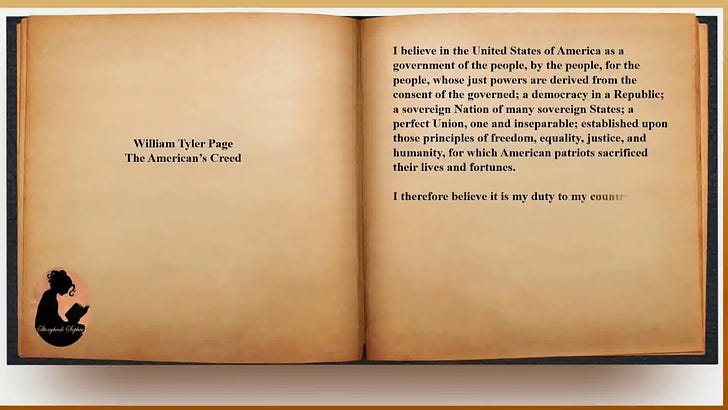What Is the American Creed? Might Learning It Avert Toxic Division Or Even A New Civil War?
Students recite the Pledge of Allegiance, but does it help them understand America or become better citizens? Perhaps. But not if, as I observed as a teacher, too many students recite it in boring rote. The words had lost meaning for them, if they ever seriously considered what the words meant. Many students recited the pledge simply because they were forced to say it, not because they understood.
Might adding another creed help students understand America better, help them avoid toxic division or even a new civil war? A bipartisan group of leaders thinks it might.
William Tyler Page (October 19, 1868- October 20, 1942) was a congressional employee when he authored “American’s Creed” in 1917 for a nationwide patriotic writing competition. Page was later elected Clerk of the House of Representative and Emeritus Minority Clerk. His “American’s Creed” has sometimes comprised part of the Naturalization Ceremony to swear in new American citizens.
Trailer for “The American Creed,” a PBS documentary. A link to the full video is below.
Pulitzer Prize-winning historian David M. Kennedy and former Secretary of State Condoleezza Rice, from remarkably different backgrounds, life experiences and points of view, joined together to host a spirited inquiry into the idea of a unifying American creed. This documentary frames the stories of a range of citizen-activists striving to realize their own visions of America’s promise across deep divides.
This article is part of a “Slender Threads” mini-course on the future of democracy — 12 thoughtful articles for you to read and interact with, available to paying subscribers for $5, with Zoom discussions when requested. It’s free for paid subscribers.
Keep reading with a 7-day free trial
Subscribe to Slender Threads / Global Citizens / Public History to keep reading this post and get 7 days of free access to the full post archives.




